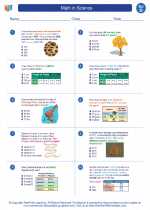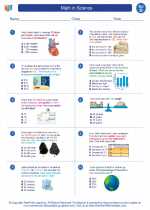Gas
In science, gas refers to a state of matter in which particles are spread out and move freely. Gases have no definite shape or volume and expand to fill the space they are in.
Properties of Gases
Gases have several unique properties:
- Expansion: Gases expand to fill the container they are placed in.
- Compressibility: Gases can be easily compressed into a smaller volume.
- Diffusion: Gases mix evenly and completely with other gases in the same container.
- Low Density: Gases have low density compared to liquids and solids.
- No Fixed Shape or Volume: Gases take the shape and volume of their container.
Behavior of Gases
Gases behave according to the gas laws, which describe the relationships between the pressure, volume, and temperature of a gas. The main gas laws include:
- Boyle's Law: Describes the inverse relationship between the pressure and volume of a gas when temperature is held constant.
- Charles's Law: Describes the direct relationship between the volume and temperature of a gas when pressure is held constant.
- Gay-Lussac's Law: Describes the direct relationship between the pressure and temperature of a gas when volume is held constant.
- Combined Gas Law: Combines Boyle's, Charles's, and Gay-Lussac's laws into a single equation.
Applications of Gases
Gases have numerous practical applications in everyday life and industry, including:
- Powering vehicles through combustion of gasoline or natural gas.
- Providing heating and cooking fuel in the form of natural gas and propane.
- Supporting breathing in scuba diving through the use of compressed air or oxygen tanks.
- Industrial processes such as refrigeration, air conditioning, and manufacturing.
Study Guide
When studying gases, it is important to understand the behavior of gases, the gas laws, and their practical applications. Here are some key points to focus on:
- Describe the properties of gases and how they differ from solids and liquids.
- Explain the behavior of gases in relation to pressure, volume, and temperature changes.
- Understand the gas laws and how they are applied in various situations.
- Explore the real-world applications of gases and their importance in daily life and industry.
Remember to practice solving problems related to gas laws and applications to solidify your understanding of the topic.
.◂Science Worksheets and Study Guides Fourth Grade. Math in Science
Study Guide Math in Science - 4th grade
Math in Science - 4th grade  Worksheet/Answer key
Worksheet/Answer key Math in Science - 4th grade
Math in Science - 4th grade  Worksheet/Answer key
Worksheet/Answer key Math in Science - 4th grade
Math in Science - 4th grade  Worksheet/Answer key
Worksheet/Answer key Math in Science - 4th grade
Math in Science - 4th grade 

 Worksheet/Answer key
Worksheet/Answer key
 Worksheet/Answer key
Worksheet/Answer key
 Worksheet/Answer key
Worksheet/Answer key

The resources above cover the following skills:
Science as Inquiry and Process (SA1, SA2, SA3)
The student develops an understanding of the processes of science by asking questions, predicting, observing, describing, measuring, classifying, making generalizations, inferring and communicating.